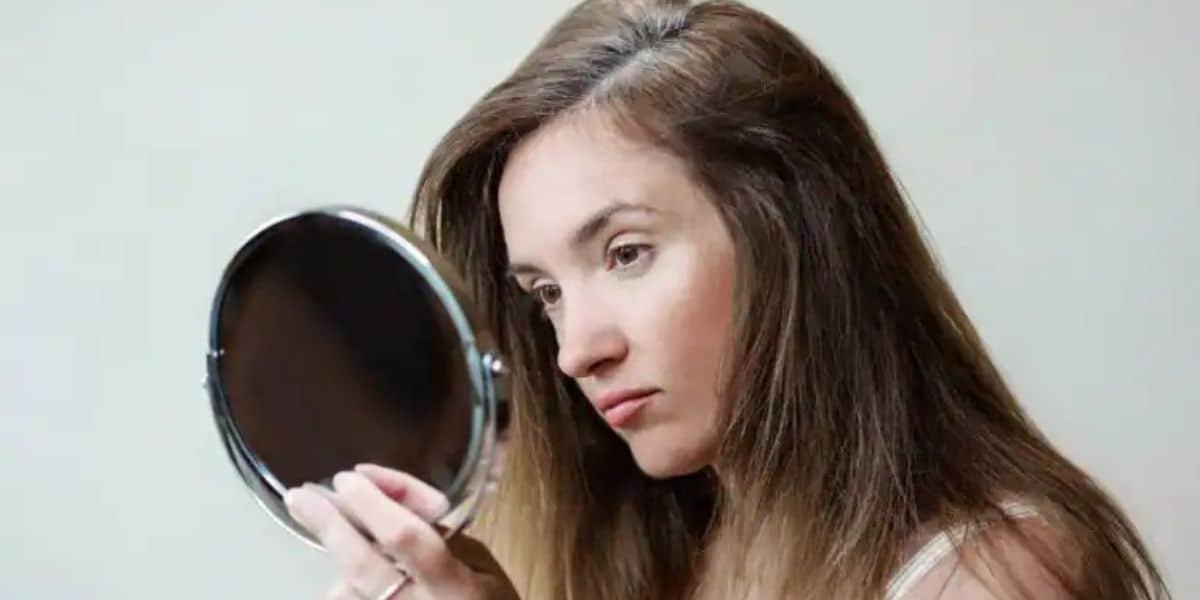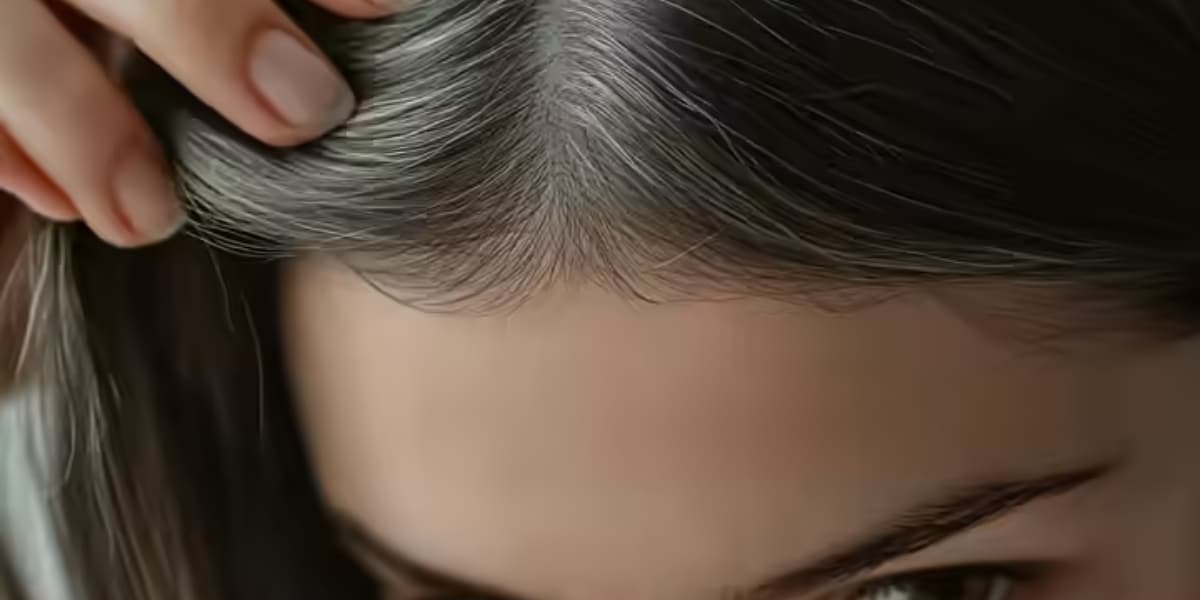Blog
What Causes White Hair at Early Age? Top 5 Reasons

White hair is often associated with aging, but many people notice the first strands of white or gray hair well before they reach their 40s. While this can be frustrating or worrying, it is important to understand that early graying can happen for a variety of reasons. In this article, we will explore the top 5 causes of white hair at an early age and how they affect individuals both internationally and locally in Pakistan.
White Hair At An Early Age
Premature greying of hair is one of the most unpleasant problems of today’s youth, both boys and girls. The occurrence of white hair at an early age can be attributed to various factors such as genetics or certain medical conditions. Although this may seem unusual, it is generally not just a cause of concern or a sign of severe health problems. Grey hair occurs when melanin production, the pigment responsible for hair colour, decreases. This reduction can occur at any age, including childhood.
You can blame it on factors like stress, pollution or bad eating habits; there is no denying that “one little strand” of grey hair makes us panic and immediately seek medication or turn to home remedies. In most cases, white hair at an early age can result from genetics and does not indicate any underlying health problems.
It is best to speak with a doctor to rule out any health issues if you start to detect white hair at an early age. They can evaluate your general health and, if necessary, offer suitable advice. However, without any symptoms or other health problems, grey hair is generally considered a natural variation and is not a cause for concern.
Top Reasons of White Hair At A Young Age?
1. Genetics: The Most Common Cause of Early Graying
One of the primary reasons for premature white hair is genetics. If your parents or grandparents turned gray early, there is a high chance that you will too. This is the most common cause of early graying, and it is usually beyond our control.
How Genetics Work in Hair Color
Human hair color is determined by the amount and type of melanin present in the hair follicles. Melanin is a pigment responsible for the color of our skin, eyes, and hair. Over time, melanin production decreases, leading to gray or white hair. If your family members experienced early graying, it’s likely that the same genetic factors are at play in your case.
Genetic Data:
- Studies show that early graying is more common among individuals of European and Asian descent. For instance, a study in the UK found that about 6% of people experienced gray hair by the age of 20, and around 23% by age 30.
- In Pakistan, early graying is also common, especially among individuals who have a family history of premature graying. It is not unusual to see individuals in their early 20s with noticeable white or gray hair, often linked to genetic predisposition.
2. Vitamin Deficiencies and Nutritional Imbalance
Lack of certain vitamins and minerals in the diet can also contribute to the early onset of white hair. Deficiencies in vitamins B12, iron, and folic acid are known to cause premature graying.
How Deficiencies Affect Hair Color
- Vitamin B12: This vitamin plays a crucial role in the production of red blood cells, and a deficiency can impair melanin production in hair follicles, leading to early graying.
- Iron: Iron deficiency can lead to hair thinning and a reduction in hair pigmentation.
- Folic Acid: Folic acid helps in the production of red blood cells and supports hair health. A lack of folic acid can cause premature graying.
Signs of Nutritional Deficiencies
- Pale skin, fatigue, and weakness are common symptoms of vitamin B12 and iron deficiencies.
- For folic acid deficiency, you may notice thinning hair along with early graying.
In Pakistan, dietary imbalances due to poor nutrition or lack of access to a balanced diet can lead to vitamin deficiencies. The widespread consumption of fast food and a limited intake of fresh fruits and vegetables, especially in urban areas, contributes to the rise of such deficiencies.
3. Stress: Can It Really Turn Your Hair White?
It is a common belief that stress causes your hair to turn white, but how true is this? The impact of stress on early graying is still under research, but there is evidence suggesting that chronic stress can play a role in the process.
The Science Behind Stress and Hair Color
Stress triggers the release of cortisol, a hormone that can damage the DNA in your hair follicles. Over time, this damage can lead to a decrease in melanin production, causing hair to lose its color. Additionally, stress can lead to telogen effluvium, a condition where excessive shedding occurs, which may make white hair more visible.
In Pakistan, stress levels have increased due to various factors such as work pressure, economic instability, and personal challenges. These factors, combined with the high rates of mental health issues in the country, could potentially contribute to earlier graying in younger individuals.
4. Hormonal Changes and Imbalances
Hormonal changes are another significant cause of early graying. As we age, our hormone levels fluctuate, but in younger individuals, an imbalance can lead to early onset of white hair. This is especially common among women who experience thyroid imbalances or polycystic ovary syndrome (PCOS).
How Hormones Affect Hair Color
Hormones like thyroid hormones and androgens regulate the production of melanin in hair follicles. An imbalance in these hormones can lead to premature graying. For instance, an overactive or underactive thyroid can affect hair pigmentation.
Hormonal Imbalances and Early Graying in Women
- Women with PCOS often experience hormonal changes that can lead to premature graying.
- Pregnancy and menopause are also associated with hormonal fluctuations that may trigger the graying process earlier than usual.
In Pakistan, issues such as untreated thyroid disorders and PCOS are common. According to the Pakistan Medical Association, PCOS affects approximately 10-15% of women, and hormonal imbalances related to thyroid issues are widespread. Both conditions are known to contribute to early graying.
5. Environmental Factors and Pollution
Exposure to environmental stressors such as air pollution, UV rays, and chemicals can also accelerate the process of graying. Pollution and harmful chemicals can damage hair follicles, leading to reduced melanin production.
How Pollution Affects Hair
The pollutants in the air, such as particulate matter (PM) and free radicals, can damage the hair follicle cells and interfere with the melanin-producing process. UV radiation from the sun also accelerates the aging of hair follicles, leading to premature graying.
In cities like Karachi, Lahore, and Islamabad, air pollution levels are high, and prolonged exposure to this pollution may contribute to earlier graying. Pakistan ranks among the top 10 countries with the worst air quality in the world, according to the World Air Quality Report. The high levels of carbon particles in the air can exacerbate skin and hair issues, including premature graying.
How to Prevent White Hair at an Early Age or Premature Graying?
Preventing premature graying is not always possible due to genetic factors, but there are several steps you can take to minimize its occurrence:
1. Maintain a Healthy Diet
Eating foods rich in vitamins and minerals, especially Vitamin B12, iron, and folic acid, helps promote healthy hair and prevent early graying. Include leafy greens, nuts, seeds, eggs, and dairy products in your diet.
2. Manage Stress
Chronic stress is linked to premature graying. Incorporate stress-reducing activities like yoga, meditation or regular exercise to help manage stress levels.
3. Protect Hair from Environmental Damage
Pollution and UV exposure can damage your hair and promote graying. Protect your hair with scarves, hats or UV-protectant hair sprays when outdoors.
4. Regular Hair Care
Use natural, mild shampoos and avoid excessive heat styling or chemical treatments that can damage your hair follicles.
What Is The Treatment For White Hair at a Young Age?
While there is no scientifically proven way to reverse white hair completely, the following treatments can help manage premature graying:
1. Hair Dyes
One of the most common solutions for white hair is to use hair dye. Opt for natural or organic dyes to avoid harmful chemicals.
2. Natural Remedies
Some people use natural oils such as amla oil, coconut oil, or black sesame seeds to darken their hair. Though not scientifically proven, many find these remedies help improve hair health.
3. Supplements
Certain supplements, like biotin, vitamin B12, and folic acid, may support hair health and pigmentation. It’s important to consult with a healthcare provider before starting any supplementation.
4. Medical Treatments
For underlying medical conditions, such as thyroid imbalances or vitamin deficiencies, getting proper treatment or hormone therapy can slow down the process of graying.
Conclusion: Understanding the Causes of Early Graying
While there are several reasons for early white hair, the most common causes include genetics, nutritional deficiencies, stress, hormonal imbalances, and environmental factors. While you may not have control over genetics, many of the other causes can be managed with the right lifestyle choices. By maintaining a healthy diet, managing stress, and protecting yourself from environmental pollutants, you can slow down the graying process.
If you’re experiencing premature graying, it’s a good idea to consult with a healthcare professional to rule out any underlying health issues. Curious about how age affects hair color? Try this instant age calculator to see how old you are in years, months, days, and even seconds!
In Pakistan, where genetic factors and environmental influences play significant roles, understanding these causes is essential to dealing with early graying effectively.
Ultimately, while early graying may be frustrating, it is a natural part of the aging process for many people. Embracing it with a positive mindset and focusing on overall health can help reduce stress and improve your quality of life.


